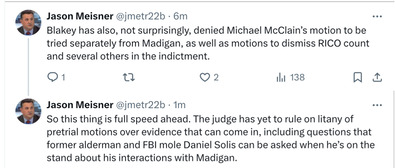* Tribune courthouse reporter Jason Meisner…


* From the pretrial order…
Defendants first argue that the Court must dismiss any bribery charges brought under § 666 on the grounds that, post-Snyder, the Government must allege a quid pro quo, and the indictment in this case fails to do so. Following Snyder, the Government concedes the required existence of a quid pro quo, but argues that the indictment in this case satisfies the quid pro quo requirement as contained in the bribery statute.
As noted above, in Snyder, the Court confirmed that a “state or local official can violate § 666 when he accepts an up-front payment for a future official act or agrees to a future reward for a future official act.” Snyder, 144 S. Ct. at 1959. Defendants argue that the Government has failed to allege a violation of § 666 because it does not identify any particular official act Madigan took in response to a particular hiring decision by ComEd; rather, the Government describes a series of job recommendations over the course of eight years and describes various legislative actions but fails to draw any connection between the two. This, Defendants argue, fails to constitute a quid pro quo. […]
But contrary to Defendants’ characterization, the indictment does not merely allege that ComEd hired certain individuals recommended by Madigan and that, during the same time period, Madigan happened to vote in favor of certain legislation affecting ComEd. Rather, it explicitly alleges that Madigan performed official acts related to legislation affecting ComEd in exchange for ComEd’s hiring of certain individuals. There is no doubt the indictment “contains each of the required elements and was sufficient to notify” the Defendants of what the Government “intended to prove,” United States v. Vaughn, 722 F.3d 918, 926 (7th Cir. 2013), providing “ample
opportunity to develop a defense to” each of those charges, United States v. Agostino, 132 F.3d 1183, 1191 (7th Cir. 1997). Thus, under Snyder, these allegations sufficiently allege a violation of § 666.
Further, Defendants argue that these allegations cannot constitute a quid pro quo because the indictment fails to connect a specific official act Madigan performed in exchange for a specific hiring decision. But, as Defendants acknowledge, the Seventh Circuit has held that the Government may prove bribery charges under a stream of benefits theory. See Ryan v. United States, 688 F.3d 845, 852 (7th Cir. 2012) (finding “stream of benefits” theory valid where the “corruption here was more like a meal plan in which you don’t pay for each item on the menu,” but rather “there is a cost that you pay, an ongoing cost, and you get your meals”); United States v. Solomon, 892 F.3d 273, 277 (7th Cir. 2018) (acknowledging agreements to pay a bribe may include “schemes that involve a stream of benefits over time, not just singly negotiated deals”).
While Snyder clarified the reach of § 666, it did not alter binding Seventh Circuit precedent regarding the stream of benefits theory or its impact on the quid pro quo requirement. Indeed, even Defendants’ own authority acknowledges that the “quid pro quo requirement is satisfied so long as the evidence shows a ‘course of conduct of favors and gifts flowing to a public official in exchange for a pattern of official actions favorable to the donor.’” United States v. Jennings, 160 F.3d 1006, 1014 (4th Cir. 1998) (quoting United States v. Arthur, 544 F.2d 730, 734 (4th Cir. 1976)). On a motion to dismiss, the Defendant’s “constitutional right is to know the offense with which he is charged, not to know the details of how it will be proved.” gostino, 132 F.3d at 1191 (quoting United States v. Kendall, 665 F.2d 126, 135 (7th Cir. 1981)). Under this standard, the Government has sufficiently alleged a claim for bribery under § 666.9
Click here for the full document.
…Adding… Sun-Times…
A federal judge on Wednesday declined to dismiss criminal charges leveled against former Illinois House Speaker Michael J. Madigan involving an alleged bribery scheme at ComEd, despite a U.S. Supreme Court ruling this summer that threatened the feds’ case against the powerful former politician.
U.S. District Judge John Blakey’s ruling came down less than a week before Madigan is set to face trial, and less than an hour before a status hearing in the high-profile case.
News that the Supreme Court picked up a northwest Indiana corruption case interrupted momentum prosecutors built in 2023, when they secured convictions against nine people in five trials that resulted from public corruption investigations here. […]
But the ultimate effect of the Supreme Court’s deliberations on Madigan’s case appear to be miminal, so far. The court ruled that a key federal law employed against Madigan outlaws bribery but not after-the-fact rewards known as “gratuities.”
Prosecutors have acknowledged the court’s ruling and have insisted they can still move forward on a so-called “stream of benefits” theory. In his ruling Wednesday, Blakey said that would satisfy the Supreme Court’s “quid pro quo” requirement.



- Anon E Moose - Wednesday, Oct 2, 24 @ 8:55 am:
“the trial will commence as scheduled on October 8, 2024″
- Annonin' - Wednesday, Oct 2, 24 @ 1:16 pm:
Interesting. Guessing “stream of benefits” goes to the junk yard as “theft of honest services” in the not too distant future.
- Dotnonymous x - Wednesday, Oct 2, 24 @ 1:38 pm:
Quid pro quo has one legal definition.